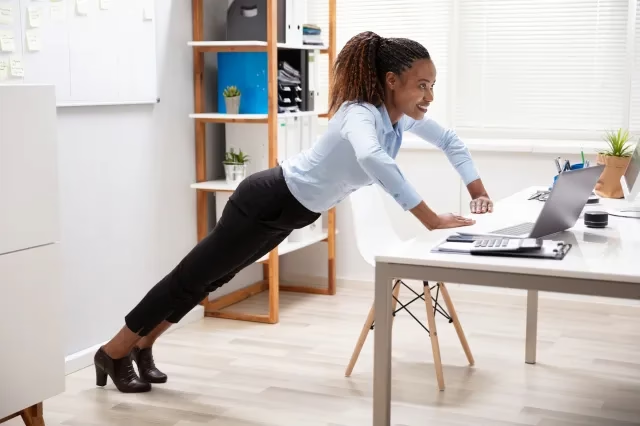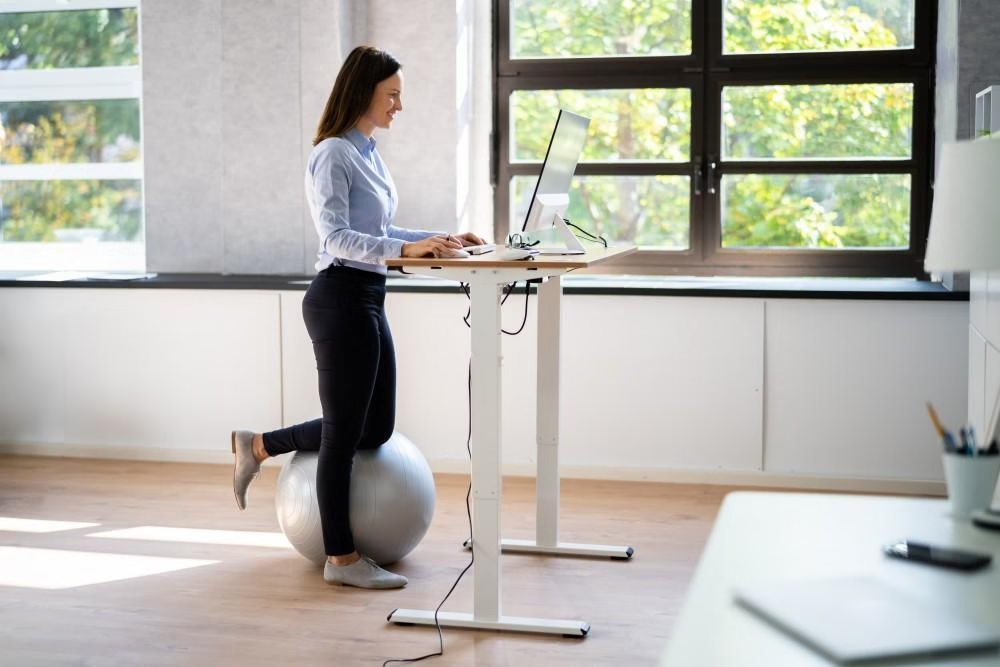Sitting all day in desk jobs does not have to wreck the body. Tight hips, a stiff neck, low energy, and slow weight creep can be managed with small, hidden habits. The fix is simple: quick micro-breaks, stealth strength moves, smart snacks, and tiny systems that run in the background of a busy day.
These tips reflect 2025 office norms, including hybrid schedules, walking meetings, and under-desk tools, so they work anywhere. If injuries or pain are present, check with a healthcare professional first.
How office workers with desk jobs secretly stay fit comes down to tiny, repeatable actions that no one notices, yet the body does.

Micro-breaks that boost energy without drawing attention
Short, quiet breaks refuel focus and reduce stiffness. Think 60 to 120 seconds each hour, then back to work. A silent phone timer or calendar alert nudges consistency. By the end of the day, these resets add hundreds of steps and a surprising lift in mood.
Small breaks are not fluff. They restore attention and reduce stress. For a quick overview of why micro-breaks help, see Calm’s guide to micro-breaks. For structure, NASA’s simple “stand and stretch” pattern tracks with what most bodies need during long sitting, as outlined in the NASA Deskfit booklet.
Recent workplace reporting also backs this trend toward short, intentional pauses, like this 2025 note on brain resets from Forbes on microbreaks. Prefer a practical checklist format? This wellness piece offers a clear timer approach: Apex Benefits on scheduling microbreaks.
The 60-second stand-up routine
Use this quick sequence each hour. No sweat, no noise.
- Stand tall, feet under hips, spine long.
- 10 shoulder rolls, slow and controlled.
- 10 calf raises, lift and lower on the toes.
- 5 slow neck tilts per side, no forcing.
- 10 deep belly breaths, in through the nose, out through the mouth.
If possible, add a 30 to 60 second walk to refill water or check the printer. Set a silent timer on the phone or a recurring calendar reminder once each hour.
Easy desk stretches for neck, chest, and spine
Quiet moves, 10 to 20 seconds per hold, help posture and comfort.
- Seated neck stretch: sit tall, gently tilt head to one side, keep shoulders down, switch sides.
- Chest opener: sit or stand, lace hands behind the back, lift the chest, hold a soft gaze.
- Seated spinal twist: sit tall, rotate torso to one side with a hand on the chair back, breathe, then switch.
- Wrist flexor stretch: extend one arm, palm up, gently pull fingers back with the other hand, switch.
These target the usual culprits of long sitting and typing.
Seated core and glute squeezes while typing
Discreet muscle work boosts blood flow without moving much.
- 10 to 15 glute squeezes, hold each for 2 seconds.
- 10 to 15 abdominal breaths, pull the belly gently toward the spine as you exhale.
- 20 to 30 ankle pumps per side to reduce lower leg stiffness.
Light isometrics support posture with zero sweat and zero noise.
Turn calls and messages into step wins.
Stand for phone calls. Pace during voice messages. Walk to a coworker for quick questions instead of sending a chat. Pick a call-time step target, like 1,000 to 2,000 steps a day. It adds up, and no meeting gets interrupted.
Stealth strength and cardio at the desk job, no gym needed
Short movement bursts fit into natural breaks, like file uploads or meeting prep. Keep moves quiet, use controlled tempo, and pick furniture that stays put. A few sets per day build real strength.
Under-desk elliptical or pedals for all-day cardio
Light pedalling while typing can raise daily calorie burn and improve circulation. Keep it comfortable, not strenuous.
- Adjust chair height so knees track smoothly.
- Wear flat shoes for better control.
- Keep resistance low to avoid rocking the torso.
- Aim for 10 to 20 minutes at a time, a few times a day.
This doubles as a gentle fidget tool that keeps legs awake.
Chair squats and desk push-ups that look natural
Two simple moves, fast setup, real benefits.
- Chair squats: 2 sets of 8 to 12 reps, before lunch and midafternoon. Stand up and sit down with control, keep knees in line with toes, keep shoes quiet.
- Desk push-ups: 1 to 2 sets of 8 to 12 incline push-ups against a sturdy desk. Brace the core, keep the body straight, move slowly.
Pick stable furniture and keep the pace smooth so it blends into the workday.
Resistance bands and isometrics for full-body strength
A mini band fits in any drawer and works almost every muscle.
- Band rows: anchor the band around a stable point, pull to the ribs, and squeeze shoulder blades.
- Band pull-aparts: arms at chest height, pull the band wide, keep your shoulders down.
- Lateral band walks: small side steps, knees soft, core engaged.
- Wall sit: hold 20 to 45 seconds if privacy allows, press lower back gently into the wall.
Keep ranges small and quiet, focus on posture and breathing.
Stair bursts and elevator swaps for quick cardio
Stairs offer short, potent cardio that looks normal.
- Walk 2 to 4 flights at a steady pace during breaks.
- Hold rails, keep steps even, and avoid rushing.
- No stairs? Ride the elevator to one floor lower, walk up one flight.
Short bouts beat long slumps in a chair.

Walking meetings that boost ideas and steps
Walking and talking go well together, especially for one-to-ones and brainstorming.
- Pitch a 15 to 20-minute loop near the office.
- Record quick notes with a voice memo.
- Pick a quiet route and set a clear agenda.
- For hybrid or remote days, shift to phone walks.
This turns time on the calendar into progress for the body and the project.
Office food, hydration, and recovery that support staying fit
Nutrition does not need to be perfect to help. Aim for steady energy and simple wins. Hydrate, eat balanced snacks, and keep protein in each meal to support muscles from micro-workouts.
Hydration habits that drive focus and steps
Keep a refillable bottle at the desk and sip throughout the day. Tie water refills to hourly stand breaks to stack steps. A simple target like 6 to 10 cups can work for many people, then adjust for thirst, weather, and activity.
Smart snack swaps that do not spike energy
Stock a small snack kit to dodge vending machines.
- Fruit plus nuts.
- Greek yogurt.
- String cheese with whole-grain crackers.
- Hummus with carrots or snap peas.
These pair protein or fat with fibre to steady energy.
Protein-forward desk lunches that travel well
Build lunches that pack clean protein, produce, and fibre.
- Salad bowl with chicken or tofu, olive oil, and seeds.
- Grain bowl with eggs, roasted veggies, and avocado.
- Whole-grain wrap with tuna and greens, plus fruit.
Protein helps recovery from the day’s small strength work, even if the sets are short.
Caffeine timing and stress resets
Cut caffeine 6 to 8 hours before bed to protect sleep. Two quick resets help on busy days:
- 60 seconds of slow nasal breathing, long exhale.
- A short walk outside for light and a mood bump, if possible.
Recovery keeps the next day consistent.
Make it stick: simple systems, trackers, and culture hacks
Habits grow when they are tiny, tracked, and part of the office rhythm. Use prompts, small goals, and friendly accountability.
Calendar nudges and micro-goals that actually happen
Set hourly stand reminders. Add one 10-minute walk after lunch. Pick a weekly target like 5 walking meetings or 3 mini strength blocks. Keep goals small and clear so they survive busy days.
For structure and motivation, this quick guide offers a timer-first approach: Apex Benefits on scheduling microbreaks. For a simple example of how micro-breaks feel in real life, see this personal note on reduced burnout from a productivity community: Tiny breaks helped focus.
Wearables and step goals that fit a desk job
Pick a realistic daily step range like 6,000 to 8,000 on heavy office days. Split steps across calls, breaks, and commutes. Enable silent reminders so meetings are not disturbed. Watch weekly averages more than daily swings.
Buddy systems and low-key office challenges
Pair up with a coworker for a daily hallway loop or stair check-in. Try a simple monthly challenge, such as 20 walking meetings or 15 stair sessions. Keep it friendly and supportive, not competitive. Progress beats perfection.
Ergonomic setup and posture cues that save the back
A quick posture check pays off.
- Feet flat, weight balanced.
- Screen at eye level.
- Elbows near 90 degrees.
- Lumbar support is in place.
- The chair supports a neutral spine.
Better posture makes movement easier and reduces strain.
Hybrid, travel, and work-from-home tweaks
The plan survives any setting with small swaps.
- Airport days: terminal walks between gates, light calf raises at the charger.
- Hotel stays: stair sessions, wall sits, band rows.
- Home office: timer-based breaks, hallway laps, quick floor push-ups.
The goal stays the same: move a little and often.
Conclusion
Tiny, steady habits keep office workers fit, focused, and calm. Here is a simple 5-day starter plan that builds momentum fast.
| Day | Movement Blocks | Steps Goal | Food Focus |
|---|---|---|---|
| Mon | Hourly 60-second stand-ups, 2 sets of chair squats, 1 desk push-up set | 7,000 | Protein lunch, fruit plus nuts snack |
| Tue | Under-desk pedals 2 x 15 min, 1 walking meeting | 7,000 | Greek yogurt snack, grain bowl lunch |
| Wed | Hourly stretches, 2 stair bouts, band pull-aparts | 7,500 | Wrap with tuna, hummus with carrots |
| Thu | 10 min post-lunch walk, wall sit holds, ankle pumps | 7,000 | Salad with chicken or tofu, string cheese and crackers |
| Fri | Two 10-minute walks, 2 sets of chair squats, desk push-ups | 8,000 | Protein at lunch, steady water intake |
One clear step to start: set the first hourly timer now and do the 60-second stand-up routine. Small moves, repeated often, build a body that handles long workdays without feeling stuck.
For added support, bookmark these quick reads on breaks and desk-friendly movement: Calm’s micro break guide, NASA’s Deskfit booklet, and a 2025 take on short breaks for brain health from Forbes.

















